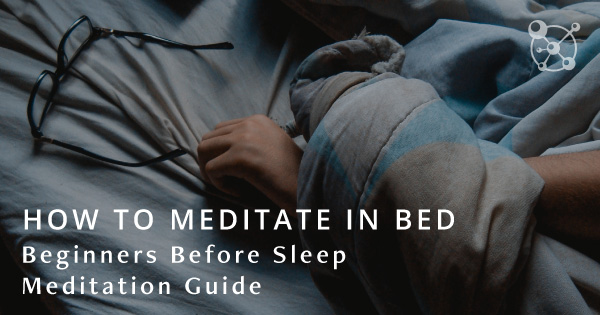Many people associate sleeping difficulties with strain. This is due to the fact that pressure can induce tension and anxiety, rendering it difficult to fall asleep. In some situations, stress might merely exacerbate pre-existing sleep problems. Today we will cover how to meditate before bed for beginners. Meditation may assist you in sleeping better. It may be used as a calming method to soothe the body and mind while also improving inner peace. Meditation, when done before sleep, may help alleviate insomnia and sleep problems by improving general serenity.
Table of Contents
Is it good to meditate before bed?
Various types of meditation have been practiced for centuries to help keep the mind in the present moment and letting go of your daily stresses by using deep breaths and guided meditation, thereby creating a better state of well-being. But should you meditate before bed and is meditating before bed good for you? With meditation practices, your body undergoes a number of physiological modifications.
These adjustments promote sleep by affecting certain bodily systems. You might be wondering what those physiological changes are and thinking “but how does meditation help sleep?” Let us take a look at some of the benefits of regular meditation practices and how they can encourage better sleep.
How to meditate in bed for beginners
- Step 1: Prepare Your Space
- Step 2: Settle Into a Comfortable Position
- Step 3: Ground Your Presence
- Step 4: Engage in Breath Awareness
- Step 5: Conduct a Body Scan Meditation
- Step 6: Implement Guided Imagery
- Step 7: Introduce Mantra Repetition
- Step 8: Embrace Silence and Stillness
- Step 9: Gently Conclude Your Session
- Step 10: Integrate Meditation into Your Nightly Routine
Step 1: Prepare your space
Here is how to prepare your area before lying down for the best results:
- • Make sure to wear clothes that are not too tight or restrictive
- • Your room should be well ventilated, and not excessively hot or cold
- • Make sure to switch off all distractions like phones and laptops
- • Lower the lighting for your meditation sessions
Step 2: Settle Into a Comfortable Position
Comfort is essential for effective meditation in bed. To ensure comfort, choose a supportive pillow and a comfortable mattress. Adjust your bedding to maintain a pleasant temperature. Position yourself in a way that relieves pressure points and allows for deep relaxation. Experiment with different meditation postures such as lying down or supported sitting to find what feels most comfortable for you. Creating a cozy and tranquil environment in your bed helps cultivate a peaceful mind and enhances the overall meditation experience.
Step 3: Ground Your Presence
Grounding your presence for meditation in bed involves creating a stable connection with the present moment while enjoying the comfort of your bed. Begin by settling into a relaxed position, ensuring your body is well-supported by pillows and blankets. Take a few deep breaths, focusing on the sensation of your breath entering and leaving your body. Feel the weight of your body sinking into the mattress, allowing yourself to fully relax. Visualize roots extending from your body into the earth below, anchoring you securely. Stay mindful of your surroundings, gently letting go of any racing thoughts or distractions. This grounding practice helps you feel centered and present, enhancing the tranquility and depth of your meditation experience right from the comfort of your bed.
Step 4: Engage in Breath Awareness
To practice breath awareness for meditation in bed, lie down comfortably with pillows and blankets supporting you. Close your eyes and take deep breaths, focusing on how the air feels entering and leaving your body. Let your breathing become natural, noticing the rise and fall of your chest or the sensation in your nostrils. If your mind drifts, gently bring it back to your breath. Lengthen your exhales gradually for deeper relaxation. This practice helps quiet your mind, preparing you for rest and fostering a sense of calm before sleep.
 Step 5: Conduct a Body Scan Meditation
Step 5: Conduct a Body Scan Meditation
1. Get Comfortable: Find a comfortable position lying down or sitting.
2. Start at Your Feet: Focus on your feet. Notice sensations like warmth or pressure.
3. Move Upward: Gradually move your attention up through your body—legs, torso, arms, neck, and head. Relax each part as you go.
4. Notice Sensations: Pay attention to any feelings or tension without judgment.
5. Complete and Relax: Finish by experiencing your whole body relaxed. When done, slowly bring your awareness back to your surroundings.
Practice this meditation regularly to enhance relaxation and mindfulness.
Step 6: Implement Guided Imagery
Using guided imagery for bed meditation involves creating a calming mental picture to enhance relaxation. Lie down comfortably and close your eyes. Imagine yourself in a peaceful place, like a beach or forest. Visualize the details—sounds of waves, rustling leaves, or warmth of the sun. Engage your senses: feel the sand beneath your feet or the gentle breeze on your skin. Stay in this scene, letting go of any thoughts. Breathe deeply and slowly, allowing your mind to unwind. This practice helps reduce stress, promote sleep, and deepen your meditation experience from the comfort of your bed.
Step 7: Introduce Mantra Repetition
Using mantra meditation in bed involves repeating a word, phrase, or sound to focus your mind and promote relaxation. Lie down comfortably and close your eyes. Choose a mantra that resonates with you, such as “peace,” “calm,” or “serenity.” Repeat the mantra silently or softly aloud with each breath. Allow the rhythm of your breath and the repetition of the mantra to quiet your thoughts. If your mind wanders, gently bring your focus back to the mantra. Relax your body and continue for several minutes, letting go of tension with each exhale. This practice helps quiet the mind, reduce anxiety, and prepare you for restful sleep right from your bed.
Step 8: Embrace Silence and Stillness
Embracing stillness and silence for bed meditation involves creating a peaceful environment conducive to relaxation. Lie down comfortably in bed, ensuring your body is well-supported. Close your eyes and take a few deep breaths to center yourself. Allow your mind to settle naturally, letting go of any racing thoughts or distractions. Embrace the quietness around you, noticing the subtle sounds of your surroundings without actively engaging with them. Focus on the sensation of your breath, the rise and fall of your chest, and the feeling of relaxation spreading throughout your body. If thoughts arise, acknowledge them gently and then return your focus to the present moment and the feeling of stillness. This practice helps calm the mind, reduce stress, and prepare you for a peaceful and rejuvenating rest.
Step 9: Gently Conclude Your Session
To end a meditation session before sleep:
1. **Gentle Awareness**: Slowly bring your awareness back to your body lying in bed. Keep your eyes closed and feel the sensation of your body resting.
2. **Deep Breathing**: Take a few deep breaths, inhaling through your nose and exhaling through your mouth. Feel your breath calming your mind and body.
3. **Mindful Reflection**: Reflect on the meditation session briefly. Notice any changes in how you feel—more relaxed, calm, or peaceful.
4. **Gratitude**: Express gratitude for the time you’ve taken to relax and meditate. Appreciate the opportunity to nurture your well-being.
5. **Intention Setting**: Set a positive intention for your sleep or the next day. It could be something like “I will sleep deeply and wake up refreshed” or “I am grateful for this moment of peace.”
6. **Slowly Open Your Eyes**: When you’re ready, slowly open your eyes while maintaining a sense of relaxation. Take a moment to adjust to the light and your surroundings.
7. **Continue Relaxation**: Carry the peaceful feeling from your meditation into your sleep. Let go of any remaining thoughts and allow yourself to drift off peacefully.
Ending your meditation session before sleep in this manner helps you transition smoothly to rest while preserving the calm and relaxation you’ve cultivated.
Step 10: Integrate Meditation into Your Nightly Routine
Practice makes perfect!
Key takeaways on meditation before sleeping
Meditation and sleeping are great bed partners. By using any of these forms of meditation, once can easily put your body in a proper state of relaxation, promoting deep sleep and feeling of rejuvenation when you wake up.
 Meditation before sleep benefits
Meditation before sleep benefits
Meditation, according to experts, may assist in a variety of ways. Sleep issues are frequently caused by anxiety and pressure, but meditation increases deep relaxation, improving your headspace and mental health. It also enhances regulation of the nervous system, lowering the ease with which you can be woken. Sometimes, you may need a pick me up and use meditation instead of sleep in order to get through your day. Other noticeable effects of breathing exercises and guided meditation are:
- • A noted increase in the sleep hormone (melatonin)
- • An increase in the precursor of melatonin (serotonin)
- • Reduction in one’s heart rate
- • Improved Blood Pressure
- • Encourages the activation of the part of your body that regulates sleep quality
Sleeping meditation techniques
To achieve a state that helps you sleep better, there are several types of meditation practices you can employ. These deep sleep meditation techniques will help you enjoy a good night’s sleep, and result in feeling fresher when you wake up.
Guided
Sometimes it is hard to get into the right headspace and the mind wanders. Having guided meditation sessions might be your best option.
Mindfulness
Mindfulness meditation is another method of achieving a still mind. By focusing on your breath and other body processes, you can bring some quiet to your mind.
Affirmation
Positive affirmations are great for instilling new beliefs while you are in a receptive and open state. This is great for your mental health and well-being.
FAQs
What is the best way to meditate before sleep?
There are several forms of meditation that promote better sleep. You can try guided meditation if you are a beginner. There is also the mindfulness technique as well as abdominal techniques. It is best to try them all and see which works for you.
Can meditation be used instead of going to sleep?
Can meditation replace sleep? Although meditation can help improve sleep and even give one more energy, it cannot replace sleep. The brain requires time to sort through the events of the day. It cannot do this properly without sleep.
How long should you meditate before bed?
Meditating for 10-20 minutes before bed can calm the mind, reduce stress, and promote better sleep quality, fostering a peaceful transition into restorative rest.
Does meditation help with sleep?
Meditation promotes relaxation, reduces stress hormones, and improves sleep quality by calming the mind and preparing the body for rest, aiding in achieving deeper and more restorative sleep.
Is meditation for insomnia and anxiety proven to work?
Meditation for anxiety and insomnia has been shown to be highly effective and promising. Disclaimer: It might not work for everybody. You might need to see a doctor about other potential underlying causes if meditation does not help you.
Interested in becoming a QHHT Practitioner?
Find out how YOU can become a QHHT Practitioner. We offer an entire online course journey to get you started, growing, and achieving your goals.


Jade Small
I am a creative and a wanderer. Mysteries and connections are what inspire me to write. While on my path, my purpose is to bring you information to help inspire you on your journey on this place called earth.
See more from these categories
Read similar posts

It is not surprising that there has been a recent increase in spiritual energy healing. One of the most popular methods is aligning and clearing away blockages from our 7 chakras. One of the seven is your third eye chakra which is responsible…Read More»

One of the most thought-about aspects of life is when it ends. the question on most people’s minds when they near the end of their life, is what happens to their soul when it departs from their body. Fearing death is not a new conundrum, as there are so many beliefs surrounding the afterlife, like whether you believe in heaven or hell. It is no wonder…Read More»



 Step 5: Conduct a Body Scan Meditation
Step 5: Conduct a Body Scan Meditation Meditation before sleep benefits
Meditation before sleep benefits



